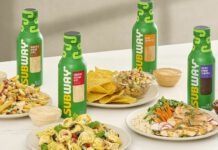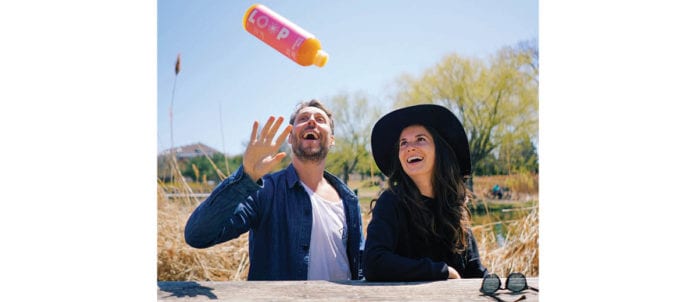It all started with a chance meeting and a timely phone call. Julie Poitras-Saulnier — a sustainability specialist in the foodservice industry — and small-business owner and entrepreneur David Côté saw a hole in the restaurant industry and decided they would be the ones to fill it. In 2016, the duo formed Loop Mission.
“We’re a circular-economy project [with a] goal to reduce food waste globally,” says Côté. “We dream of making a project where the more you sell something, the better you do for the world.”
The Montreal-based company started out making cold-pressed juice from imperfect produce and has grown into a multi-million-dollar venture.
“A grocery store called us,” says Poitras-Saulnier. “[It was] throwing away 16 tons of produce every day and asked if we could help.”
That phone call resulted in Poitras-Saulnier taking a massive leap of faith. “I quit everything, sold my house and we started Loop,” she says. “It’s crazy because, as an entrepreneur, before starting the business, I was worried and scared of risk. But with Loop, I never had that feeling — from the beginning, it was clear to me it was going to work.”
Loop has grown exponentially in its first three years — from approximately $1 million in sales in its first year to $5 million in 2019. The company has expanded, selling not only all-natural recycled juices, but beer, gin and soap as well.
What makes the company unique is its business model. “We start with a problem, look at the data [and the] overstock, then try to find a product that can use those specific ingredients,” explains Côté.
The company takes food waste from large producers, cleans it and presses it down into new products. The beer is made from day-old bread donated by bakeries, the soap created from rejected oils from a fast-food chain and the gin from potato trimmings from a potato-chip company.
“Slowly, but surely, we started getting more phone calls from other industries — bakeries, potato-chip factories, dairy factories,” says Côté. “If you had told me three years ago we would expand to a gin, beer and a soap, I wouldn’t have believed you.”
A contributing factor to Loop’s rapid success is society’s desire for a sustainable future. “It’s good timing, marketing wise; we probably should have started this 40 years ago — maybe then we wouldn’t be in such a pickle,” says Côté. “But if we started our business even 15 years ago, I don’t think we would have been as successful; people wouldn’t have been ready.”
Going forward, the company plans to continue its growth, both at home and internationally. “We’re looking at making our juices in Los Angeles and, after that, we’re looking to go international,” says Côté.


















